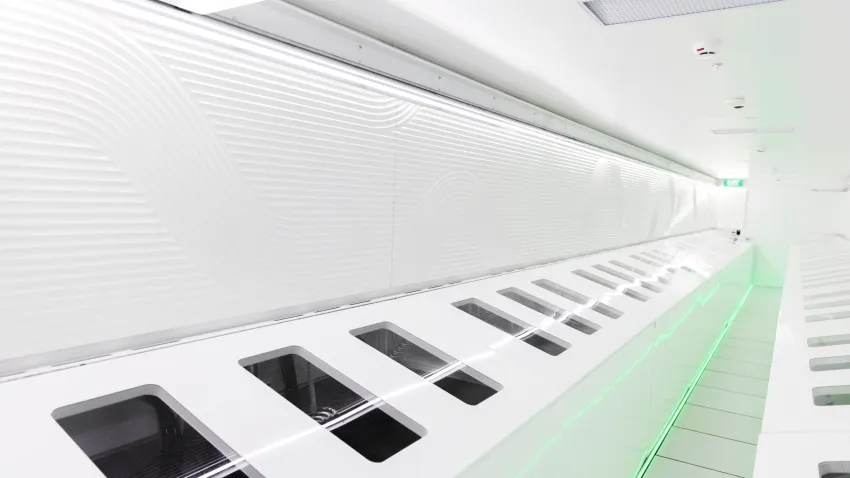As the artificial intelligence (AI) revolution gains momentum, tech giants like Microsoft, Alphabet, and Meta are pouring billions into expanding their data center infrastructure. This surge in AI development, however, comes with a significant challenge: the increasing energy demands of data centers. Enter Sustainable Metal Cloud (SMC), a company at the forefront of addressing this issue with innovative cooling technology that promises to cut data center energy consumption by up to 50%.
SMC’s Solution: HyperCubes and Immersion Cooling
SMC operates what it calls “sustainable AI factories” in Singapore and Australia, utilizing its proprietary HyperCube technology. These HyperCubes house servers equipped with Nvidia processors, but with a crucial difference: instead of relying on traditional air cooling, the servers are submerged in a synthetic oil called polyalphaolefin. This liquid immersion cooling method is far more efficient at dissipating heat than conventional air cooling systems.
Tim Rosenfield, co-founder and co-CEO of SMC, highlights the technology’s capabilities: “It enables high-density hosting for GPUs. It enables the kind of hosting we need for platforms like Nvidia’s Grace Blackwell,” referring to Nvidia’s latest generation of AI graphics processors announced in March.
The benefits of SMC’s approach are twofold. First, the company claims its immersion cooling technology can reduce energy consumption by up to 50% compared to traditional air cooling methods. Second, SMC states that its solution is 28% cheaper to install than other liquid-based cooling systems.

Flexibility and Expansion
One of the key advantages of SMC’s HyperCubes is their versatility. Designed to be compatible with any data center, these units can be deployed in unused spaces within existing facilities. This flexibility allows for rapid expansion and deployment.
“Because our solution is containerized, we can go anywhere very quickly. And we can open new availability zones to respond to our customers’ demand,” Rosenfield explained. The company is already expanding beyond its initial markets, with plans to enter Thailand and India.
Industry Partnerships and Growth
SMC has secured partnerships with industry leaders, including Nvidia and Deloitte. As a preferred cloud partner of Nvidia for computing and AI, SMC offers GPU clusters developed by the chip giant. In July, the company announced a collaboration with Deloitte, providing the consulting firm’s clients access to Nvidia’s GPU computing infrastructure for AI application development.
The company’s growth trajectory is impressive. SMC is currently in the process of raising $400 million in equity and $550 million in debt, with plans to expand its data center operations beyond Singapore, according to Bloomberg reports.
The Broader Context: Green Data Centers and Government Initiatives
The rise of AI has led to a surge in data center demand, prompting countries like Singapore to seek ways to mitigate the associated energy consumption. Singapore has committed over 500 million Singapore dollars (approximately $379.7 million) to promote “green” data centers in support of its AI ambitions.
SMC’s approach aligns with this goal, having received funding from Temasek, the Singaporean state investor that backs ST Telemedia Global Data Centres, one of Asia’s largest data center operators.
Liquid Cooling: A Growing Trend
The shift towards liquid cooling in data centers is gaining momentum across the tech industry. As performance demands increase, so does the risk of overheating, making traditional air cooling methods less efficient.
Giordano Albertazzi, CEO of digital infrastructure provider Vertiv, predicts that liquid cooling adoption could accelerate in 2024. Vertiv offers a range of thermal management solutions, including hybrid air and liquid cooling systems, as well as fully liquid-cooled data centers.
Industry giants are taking notice. During Computex Taipei in June, Nvidia CEO Jensen Huang praised Supermicro’s direct liquid cooling technology for its energy-saving capabilities and cost-efficiency in AI data centers. Supermicro CEO Charles Liang echoed these sentiments, emphasizing the improved performance, reduced pollution, and lower energy costs associated with liquid cooling.
Challenges and Future Outlook
Despite the enthusiasm surrounding liquid cooling, challenges remain in its widespread adoption. Rosenfield acknowledges that “Most data centers are not ready for liquids of any kind, whether immersion or direct chip cooling. The market is looking for the best way to deploy this, and I think there will be several options.”
Vertiv’s Albertazzi adds a note of caution, stating, “There is still a lot of air cooling going on in the data center, and that will continue to be the case in high-density AI data centers.”
The transition to liquid cooling represents a significant shift in data center design and operation. Traditional data centers rely on large aisles for air circulation to prevent overheating, which can lead to equipment failure and downtime. Liquid cooling, in theory, should allow these facilities to accommodate more servers in their existing footprint, increasing efficiency and capacity.
As the AI boom continues to strain power grids and push the limits of current data center capabilities, solutions like SMC’s immersion cooling technology are likely to play an increasingly important role. The ability to significantly reduce energy consumption while supporting the high-density computing needed for AI workloads positions such innovations at the intersection of technological advancement and environmental responsibility.
The coming years will likely see a diverse range of cooling solutions emerge as the data center industry grapples with the dual challenges of meeting the computational demands of AI and addressing energy efficiency concerns. Companies like SMC are at the forefront of this transformation, paving the way for a more sustainable and powerful AI-driven future.
Copyright©dhaka.ai
tags: Artificial Intelligence, Ai, Dhaka Ai, Ai In Bangladesh, Ai In Dhaka, Future of AI, Artificial Intelligence in Bangladesh, Nvidia



